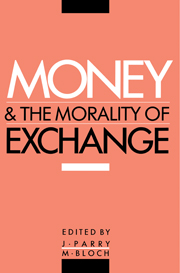Book contents
- Frontmatter
- Contents
- List of contributors
- 1 Introduction: Money and the morality of exchange
- 2 Misconceiving the grain heap: a critique of the concept of the Indian jajmani system
- 3 On the moral perils of exchange
- 4 Money, men and women
- 5 Cooking money: gender and the symbolic transformation of means of exchange in a Malay fishing community
- 6 Drinking cash: the purification of money through ceremonial exchange in Fiji
- 7 The symbolism of money in Imerina
- 8 Resistance to the present by the past: mediums and money in Zimbabwe
- 9 Precious metals in the Andean moral economy
- 10 The earth and the state: the sources and meanings of money in Northern Potosí, Bolivia
- Index
3 - On the moral perils of exchange
Published online by Cambridge University Press: 20 February 2010
- Frontmatter
- Contents
- List of contributors
- 1 Introduction: Money and the morality of exchange
- 2 Misconceiving the grain heap: a critique of the concept of the Indian jajmani system
- 3 On the moral perils of exchange
- 4 Money, men and women
- 5 Cooking money: gender and the symbolic transformation of means of exchange in a Malay fishing community
- 6 Drinking cash: the purification of money through ceremonial exchange in Fiji
- 7 The symbolism of money in Imerina
- 8 Resistance to the present by the past: mediums and money in Zimbabwe
- 9 Precious metals in the Andean moral economy
- 10 The earth and the state: the sources and meanings of money in Northern Potosí, Bolivia
- Index
Summary
Anthropologists – as indeed their informants – often stress that gift exchange and commodity exchange are premised on fundamentally opposed principles. In Gregory's neat formulation, for example, gift exchange is seen (following Mauss) as presupposing the interdependence of the parties to the exchange and the inalienability of the gift; while commodity exchange is seen (following Marx) as presupposing the reciprocal independence of the transactors and the alienability of the commodity (Gregory 1982).
This radical contrast between the principles which underlie the two types of exchange is commonly reported as being associated with an equally radical contrast in their moral evaluation. A particularly striking example is provided by Taussig's discussion (1980) of the folklore of the Christianised Black peasantry of the Cauca valley in Columbia. Some peasants who work as wage-labourers on the big sugar plantations are supposed to enter into a pact with the devil by which they increase their production and earn a better wage; but this can only be spent on consumer goods and luxuries, for such money is barren and cannot be productively invested – though some say that it can be made over to friends who can use it for productive ends. Even the cane fields cut by one who has contracted with the devil are rendered infertile. For this reason it is believed that devil contracts are made only by male wage labourers. Peasants working their own plots would not be prepared to lay waste their land by such a deal, while the value women place on fertility and the nurture of children also relieves them of the temptation to make terms with the devil.
- Type
- Chapter
- Information
- Money and the Morality of Exchange , pp. 64 - 93Publisher: Cambridge University PressPrint publication year: 1989
- 95
- Cited by



